My Analysis of 'The Shining' (Pt. 2)
Part 2: The characters and their evolution ; The Torrance family (1/2)

Jack Torrance, the vilain and victim of the story
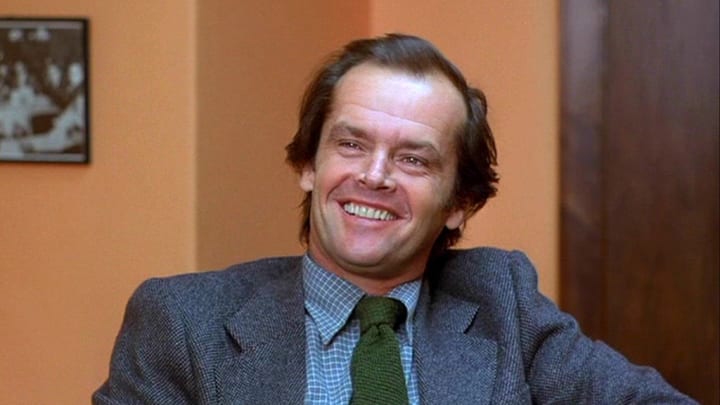
1. The mirror
The three images displayed on the mirror, located in the couple’s bedroom, at the beginning, the middle and the end of the movie, beautifully sum up the transformation Jack goes through from the first time he wakes up in the hotel’s apartment to the moment he tries to kill his family.

The first image we see in the mirror shows Jack sleeping at the beginning of the movie as Wendy enters the bedroom with his breakfast and wakes him up. Wendy is present in the reflection, showing that she’s by his side and that they still function as a couple. At that moment, he appears to see a lot of possibilities ahead of him, he looks optimistic and is looking forward to “do some work.”
However, it seems that the hotel’s spirits already took a grasp on him the moment he set foot in the hotel, as he tells Wendy he has the feeling he’s been here before. He even insists by saying how powerful this feeling was when he entered the hotel.
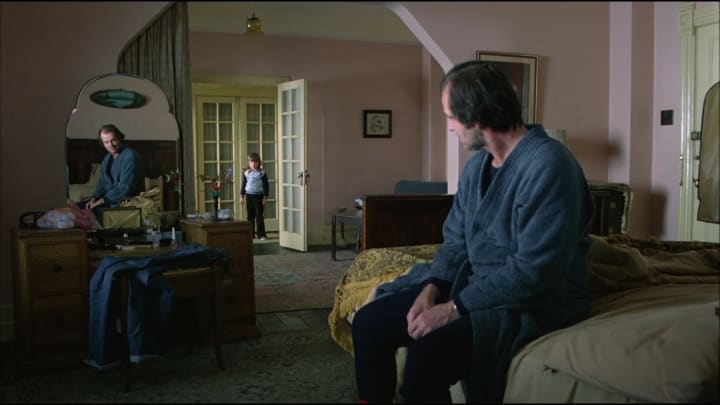
The second image shows only Jack, sitting on the couple’s bed, looking tired and defeated. This time he’s alone in the reflection, highlighting the isolation the hotel’s spirits created around him. The hotel’s spirits already got a hold on his mind and he’s not the same person he was when he first came in the hotel.
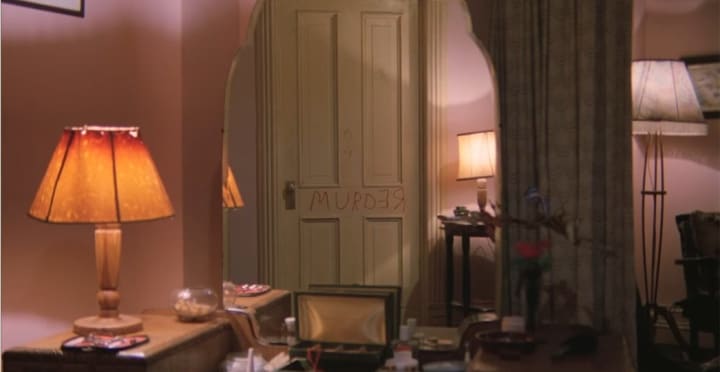
The third image of the mirror’s reflection—near the end of the movie—shows the word “REDRUM” (murder) drawn by Danny (Tony) on the bathroom door as a warning that Jack is coming to kill his wife and son. At this moment, the man trying to destroy the door with an axe is no longer Jack. The hotel’s spirits replaced everything that made Jack who he was with a merciless will to slaughter his family. The symbolism of this image: Jack entered the hotel as a man who loved his family and pursued a dream to become a writer, and he’s now gone. All that is left of him is murderous intentions.
2. Jack's state of mind towards his family at the beginning of the movie
In almost every analysis that I’ve seen or read on The Shining, it’s generally admitted that, even from the beginning of the movie, Jack hates being a father and a husband, and that he wants to break free from his family. According to these analyses, Jack secretly wants to be rid of his family and believes he would be more successful if they weren’t there.
I don’t believe that to be true, quite the contrary. In my opinion, Jack is far away from being the perfect husband/father but he loves his family deep down and doesn't want to be separated from them. When he has a nightmare in which he kills his family, he wakes up screaming and crying, clearly showing this is NOT what he wants, this is what the hotel wants.
From the first scene gathering the whole family together (in the car on their way to the Overlook Hotel) we can see that Jack seems irritated and not very talkative. When Wendy tries to engage conversation with him, he just responds by humming absently. When his son tells him that he’s hungry, he replies that he should have eaten his breakfast. But that doesn’t raise any red flags for me. It was established at the beginning of the movie that the journey to the Overlook takes at least three hours by car. Have you ever been with someone cheerful and open to conversation after several hours of driving, even if he’s with his family?

A distracted Jack drives while Wendy and Danny make conversation
For some reviewers, this scene shows that Jack is already fed up with his family, while to me he’s just annoyed—and maybe slightly tired—by the driving. It doesn’t necessarily mean that his irritation is directed towards his family. Anyone tired, on a bad mood or irritated for some reason can act like that towards his family and friends. I find that this scene is more authentic that the ones in which you can see a family laughing and talking cheerfully while on a journey in a car.
Have you ever made a road trip with your family? Well it’s fun at the beginning but you generally don’t spend the whole trip amused and upbeat.
3. Jack's transformation, from beginning to end
The hotel slowly transforms Jack into every white man that pushed Native Americans’ back when the hotel was built (founders, soldiers, bankers, builders). The hotel’s spirits take advantage of Jack’s fears and insecurities to seduce him, making him the villain and main victim of the movie. He’s the villain because he will embody the white men who desecrated the burial site and massacred the Native Americans who tried to protect it, and the victim because he will pay for a crime committed long before he was born only because he shares similar traits with the culprits.

On the other hand, Jack slowly comes to the realisation that he is never going to be a writer, and that’s why he gives in so easily when he hears the call of the hotel’s spirits. At the beginning of the movie, he admits to Wendy that he has a lot of ideas, but no good ones. Knowing he will never achieve his dream, Jack uses the hotel to escape his reality and become someone else. The hotel’s spirits basically sell a dream to Jack—that may remind us of the American dream—and gain his love by giving him a sense of belonging and appreciation. When he embodies a founder of the hotel, he becomes part of something bigger, while the maze swallows him completely.
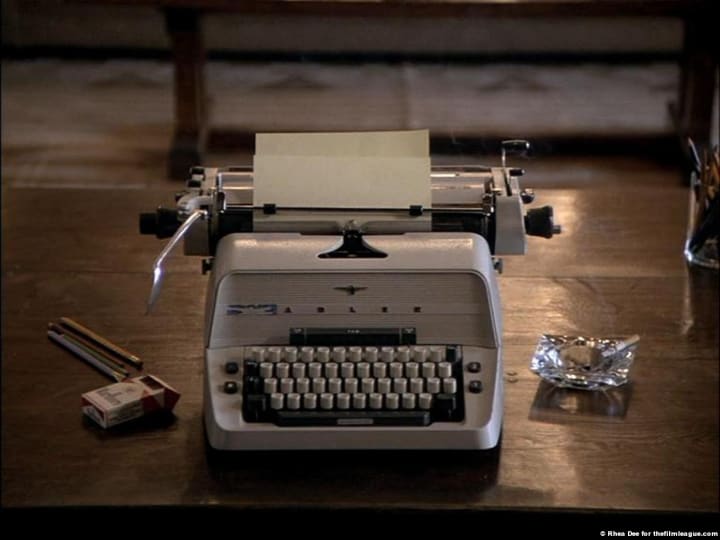
Jack's typewriter is used against him by the hotel's spirits
Even before we see the hotel’s spirits, Jack’s transformation manifests in several ways:
- He starts treating Wendy badly, mostly through verbal abuse, to antagonize her and pin on her everything that went wrong in his life.
- He tries to hide the truth to Danny by telling him that everything is fine, while Danny already senses that his father is changing.
- He falls back into old vices (drinking).
- He starts hearing whistling sounds, indicating some force is messing with his mind. On “Thursday” Wendy and Danny are playing outside in the snow. Jack stayed inside and we are guessing that he is staring at the window with a vacant look, while a hint of a smile appears on his face and his eyes turned upward. A whistling sound can be heard when we see Jack. We also see the snow truck when Wendy and Danny pass by it. Jack might be looking at it as the hotel was instructing him to destroy the truck and keep anyone from escaping the Overlook Hotel. When you think about it, everything you see in the snow scene—before we see Jack—is in danger (Wendy, Danny and the snow truck). In the movie, it’s never made clear when exactly Jack destroyed the truck but, in this scene, we have an actual hint of the last time the truck was seen operational. We can logically assume that it was destroyed not long after this scene. The whistling continues with a wide shot of the hotel under the snow.
4. Jack's brainwash and delusion
The typing machine ("All work and no play makes Jack a dull boy"): Destroying Jack's dream and replacing it with a delusion.
"All work and no play make Jack a dull boy" the spirits don’t want Jack to work, they want him to enjoy his wealth and have fun at parties, like the white men who funded and built the hotel. Working and earning their own money is beneath them. The repetition of the sentence on hundreds of pages may refer to the emptiness and lack of purpose of people who were born rich and never had to make a living on their own.

Jack eventually becomes the reincarnation of a spirit incapable of producing anything original and valuable himself. During the whole movie, we don’t see Jack acting as a caretaker, even once. He doesn’t do the job he is paid for. Instead, we have several scenes showing us Wendy conducting the caretaker’s duties (managing the machines, checking all the appliances are operational, keeping in contact with the outside world).
Jack’s goal was originally to seize the opportunity to accept the caretaker’s job and write a novel. The sentence he keeps writing over and over again instead of exploring his ideas represents the hotel’s brainwashing to persuades him that he should be playing, drinking and partying instead of working, just like the white men at the ballroom’s party, and that writing is not his true calling.
Isolation from his family (especially Wendy)
We can feel the isolation the spirits are creating around Jack in the first scene in which he acts like a complete piece of garbage towards Wendy, even though she comes to cheer him up and shows genuine interest in his work. Anguishing music plays when Jack is typing to hint that something is wrong. No matter how hard Wendy is trying to reach out, he pushes her back with both hands as if her efforts annoyed him. Jack is manifesting the first effects the hotel has on him: the hotel’s spirits seek to isolate him and make him resentful towards his wife.

At first, we see this scene from Jack’s perspective. The camera is behind him while is at the center of the screen. We can then see Wendy emerging from a hallway on the back of the hall and few seconds pass before she finally arrives beside Jack: he is difficult to reach but she makes the effort of going to him. From this point, the scene is shot as a dialogue with shots of Wendy and Jack alternatively.
We might wonder why Wendy does not replicate when Jack lashes out at her, but we can clearly see that Wendy is astonished by how quickly Jack’s anger escalates. She just does not know how to respond to that, hinting that it may be the first time she sees him get angry that fast. Jack explicitly says "Don’t come in", translating into the isolation he’s creating around him. The scene goes back to its previous setting when we see Wendy slowly exiting the room: a successful attempt from the hotel’s spirits to get rid of her.
Wendy is a cheerful, optimistic, caring, positive and forgiving character. The first step to turn Jack insane and seduce him is to keep his wife away from him and eliminate the competition.
5. Jack's alienation and loss of identity
As the movie goes on, the hotel’s spirits deploy stronger efforts to seduce Jack and convince him that he’s someone else. The first visible manifestation of the hotel’s spirit is Lloyd, the bartender. From the moment Jack sees him, it looks like the character he’s portraying changes completely.
You can see from what he says that a different person is talking:
- “I’ve always liked you Lloyd!”
- "It’s good to be back!"
- "I’ve got plenty of jackets"
- "I better change clothes before the fish and goose soirée"

Lloyd the bartender
First of all, Jack knows the name of the bartender and is not in the least surprised of seeing him behind the counter. Lloyd calls him “Sir” as if Jack occupied a prestigious position in the hotel’s management and was no longer the caretaker. The second apparition is incarnated by a ballroom crowded with rich-looking people partying. Jack is welcomed with utmost respect from the employee greeting the guests and he even gets free drinks when he goes at the bar. When he bumps into Delbert Grady, he tells him that he is going to change his outfit before the "fish and goose soirée" set up to take place later that evening. He embodies a completely different character that is imposed on him by the hotel’s spirits.
6. Jack's final mental barriers
"I and others have come to believe that your heart is not in this. That you have not the belly for it." (Delbert Grady)
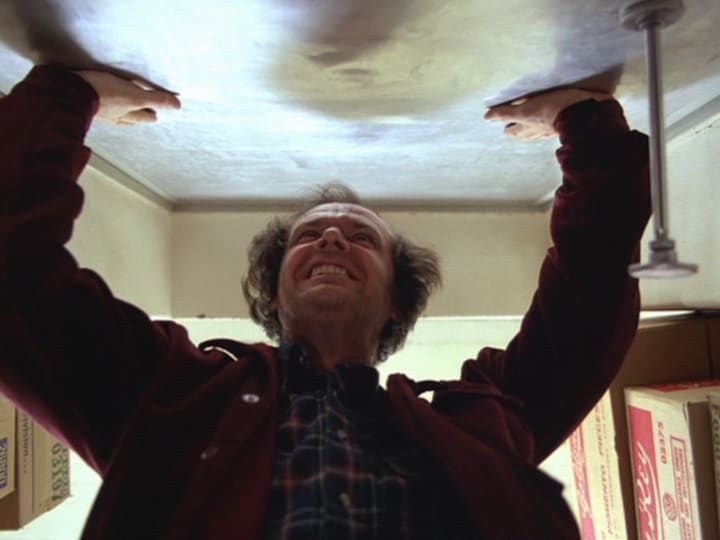
Jack locked in the storage room by Wendy
When Jack is neutralized and locked in a storage room by Wendy, the hotel’s spirits begin to doubt that Jack will have it in his heart to slaughter his family, even after all the brainwashing they conducted during the whole movie. I believe it’s proof that Jack loves his family and that his mind is actually taken over by the reincarnating spirit, despite his resistance. The fact that Jack is showing resistance is also the first sign that the spirits cannot keep the cycle of violence going forever. It may have been easier to lure men and their family to the hotel in the past but it seems it’s becoming harder and harder.
Wendy: Taking over the role of the head of family

Wendy Torrance is the character that the spectator will most likely identify with. She tries her best to find solutions while seeing her husband slowly becoming insane and her son getting hurt without understanding how and why.
Wendy always looks towards the future with hope, and tries her best to hold the family together. During her first discussion with Danny, she tries to reassure him about the hotel and tells him they will have a good time. She also acts as the caretaker by monitoring the machines and keeping in touch with the outside world. Even after she knocks Jack out and locks him in a food storage room, she keeps looking for solutions and figuring out her next move.
She loves Jack and Danny—she sometimes seems to act as a bridge between them—and she has to navigate the complexity of her relations with them:
- When Danny says he’s hungry in the car, Jack blames him for not eating breakfast and Wendy immediately comforts Danny by telling him she will fix him a plate when they arrive at the hotel.
- She tries to protect Danny from cannibalism stories and intervenes when Jack give details about the dinner party.
- When Jack has a nightmare, she first tries to protect both Jack and Danny by keeping the latter away, and then sides with Danny when she finds out he’s been injured.
- She eventually decides to leave Jack behind and takes Danny away from the hotel.
- To keep the family safe, Wendy tries her best to stay in touch with the outside world. Wendy notices that telephones are down and have a nice chat with an employee of the radio station.
Wendy is also a strong character. She shows initiative when she confronts Jack and eventually knocks him down when he threatens her. The spirits even admit that Wendy is stronger and smarter than they anticipated: "Your wife appears to be stronger than we imagined. Somewhat more…resourceful. She seems to have got the better of you."
The spirits—embodied by Delbert Grady in this scene—are surprised. They’re not used to dealing with strong, smart and resourceful women. The beginning of women’s and minorities’ empowerment is personified by a woman doctor— who visits the Torrance family when Danny pass out in the bathroom—a colored man working as the head cook in a prestigious hotel and Wendy as a strong and capable character throughout the whole movie. Time changes and the hotel belongs in the past, its powers fade away. The same goes for the spirits inhabiting it and their ideologies.
In the next article => My Analysis of The Shining; Part 2: The characters and their evolution (2/2)
About the Creator
Flora Silver
Hello everyone, I'm Flora. I am passionate about storytelling, science-fiction, fantasy, horror, space, mysteries, personal and professional growth. I will be sharing personal and fictional stories with you. I hope you will enjoy them!






Comments
There are no comments for this story
Be the first to respond and start the conversation.